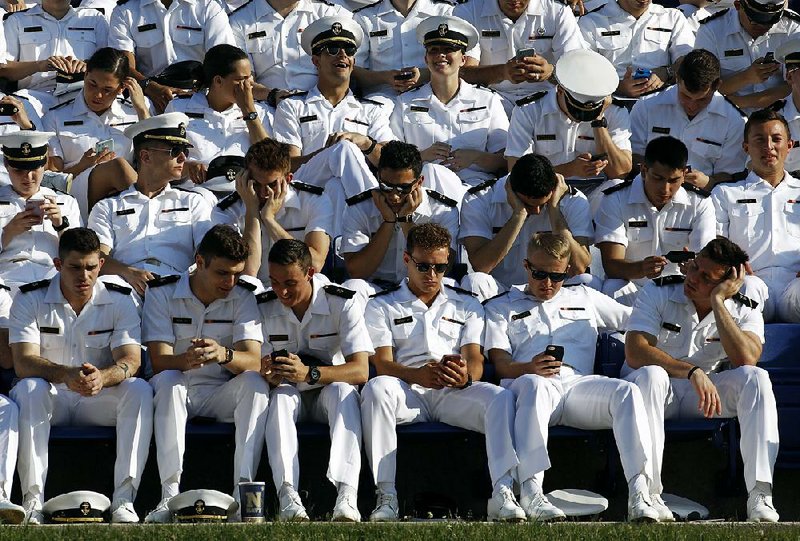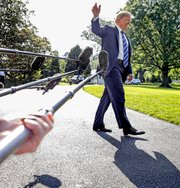ANNAPOLIS, Md. -- President Donald Trump declared Friday that the United States is "respected again" because of a military that is "a lot stronger," as he welcomed the 2018 graduates of the Naval Academy into what he called "the most powerful and rightful force on the planet."
Presidents often use the annual commencement addresses at the country's military academies to tout their foreign policy successes, urging the next generation of military officers to embrace the commander in chief's vision of a world worthy of protecting.
Trump did that, saying -- without specifics -- that the new naval officers and Marines should be proud to be joining a military that is now recovering from years of shrinkage and decay.
"We are witnessing the great reawakening of the American spirit and of American might," he said to applause from the 30,000 people in the Naval Academy's stadium. "We have rediscovered our identity, regained our stride and we are proud again."
Trump's predecessors have also used the commencements to confront the challenges of foreign policy, diplomacy and war. In 2002, after the Sept. 11, 2001, terror attacks, President George W. Bush announced a policy of pre-emptive war during his address at the Army's West Point commencement.
Trump made no mention of broad foreign policy issues or specific challenges that the country faces abroad, including the disruption this week of his efforts at international diplomacy on the Korean Peninsula. On Thursday, Trump abruptly called off his planned summit with Kim Jong Un, the leader of North Korea, citing his counterpart's "open hostility" in public statements.
The president has been intensely focused on the size and capabilities of the U.S. military since before he took office. And once in charge of the government, Trump repeatedly pledged to increase funding to the armed services that he viewed as having shriveled in previous years.
While the Pentagon's base budget was capped in 2011, funding for the military still far outstripped the rest of the world and was still higher than the next seven countries combined.
In the first months of his presidency, Trump visited the Navy's newest aircraft carrier, the Gerald R. Ford, and promised to work to "upgrade" ships and submarines, and seek more money for the sailors who operate them.
"In his remarks at the commencement Friday, Trump took note of the carrier Ford as he touted the size and strength of the country's naval forces, including what he said will eventually be "355 beautiful ships" in the fleet. He said that is "almost a couple of hundred more ships" than currently in the fleet.
In fact, in 2016, the number of active ships was 275, and the Navy plans to increase that size to 355 -- by the 2050s.
"We're building that modern fleet," he said. "We're sharpening the fighting edge of everything."
As president, Trump signed a $1.3 trillion government spending bill that dramatically increased the amount of money for the military. At the signing, the president complained that he did not want to sign the legislation because it failed to close immigration loopholes or provide enough money for a wall along the border with Mexico.
But he said the money for the military was enough to persuade him to sign the bill anyway.
"It increases total defense spending by more than $60 billion from last year and funds the addition of critically needed ships, planes, helicopters, tanks and submarines," he said during brief remarks after signing the spending bill.
"Therefore," he added, "as a matter of national security, I've signed this omnibus budget bill."
Trump has also promised repeatedly to help veterans by overhauling the Department of Veterans Affairs, a long-struggling bureaucracy. He succeeded in pushing through some bipartisan legislation aimed at improving service delivery to veterans.
During his remarks at the Naval Academy, Trump underscored those successes. He said new legislation would allow employees of the Veterans Affairs Department to be quickly fired if they are not doing a good job of caring for the health and well-being of veterans.
"We're going to take care of our great veterans," he said. "We are taking care, finally, after decades, we are taking care of our veterans."
A Section on 05/26/2018

